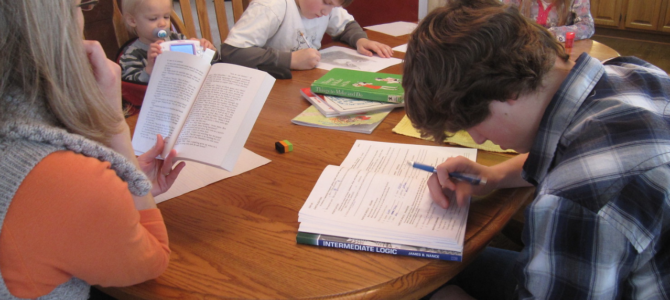Parents across the country took a deep dive over the last two weeks as home educators. How ya’ll doing?
Appreciation of teachers has risen by leaps and bounds over these 14 days, but, parents, you’re not alone. Many others have gone before you and, through trial and error, have grown and picked up many tips to pass along.
After 25 years of teaching my four kids, all with very unique needs and learning styles, I’ll give you my top 10 suggestions to help you get through this. Maybe you’ll even discover some lifelong bonuses for your family, like I did.
1. Adjustment Period
The first two weeks are always the hardest. Every year, my kids had a two-week adjustment period — from mom as comforting mother to mom as challenging teacher. Don’t give up, and don’t be discouraged. This phase will pass!
2. Structure
You need structure in both time and place. Choose an area of the house for schooling, as distraction-free as possible. Choose a time for schooling that is optimal for your child first, but also for you, especially if you are working from home. Don’t feel you have to mimic school hours; chances are you will finish in way less time.
3. Plan
Teachers make lesson plans for a reason. Kids can smell an ill-prepared teacher from a mile away. Stay ahead of them. Those little buggers are smart!
4. Read and Respond
We learn best when we interact. Take turns reading aloud, and change things up by letting your child ask you questions, instead of the other way around. Use good books or online materials to facilitate this. If your student prefers writing over talking, have him write out his questions for you.
5. Play
Integrate play, especially with math. Play the “I’m thinking of something” game, where the child asks questions to find what you are thinking of. Learning about what constitutes an isosceles triangle? Think of clues to guide them to that. Use flash cards to play “Go Fish,” or use beans to bring math facts to life. This can work with just about any kind of fact you want to cement in their memory.
6. Take a Break
Learning is tiring, and emotions can get high when frustration sets in. So take a break. Do stretches, do a physical chore, get a snack, walk the stairs or the hallway, play “I Spy” in a different room in the house or apartment, or hide something for them to find.
Put a bunch of exercises on cards in a bowl, and let them choose one. Just take a five- or 10-minute break, and get back to work — or if things get really tense, try again tomorrow. Something of that day’s work will be retained, and it will be easier the next day to move on.
7. Memorize
This is a good time to work more on character than facts. Focus on a few things: memorize poems, songs, or inspirational phrases that encourage a particular character trait. These serve as great reminders for the teacher too. Your child might not remember any facts that day, but feelings of inspiration and courage will last.
8. Explore
Every kid is interested in something. Talk about those things when you are eating lunch, and find resources online to help your child explore that thing even more. Those interests don’t have to feel academic — baking a cake is science and math, people!
9. Study Something New to You
When mom or dad is learning, too, kids seem to get excited. Try learning a language with Duolingo. You’ll see how hard it is to learn, the kids will laugh at you, and everyone will feel like they are on the same educational team.
10. Resources
So many resources are available now that I can’t begin to list them. We used the Calvert School and the University of Nebraska Lincoln Independent High School. The Home School Legal Defense Association and the Khan Academy are great resources, and my two favorite educators, Marva Collins and Charlotte Mason, offer wonderful educational philosophy inspiration.
This season of homeschooling may be short for your family, but it can be a deeply gratifying time of getting to know your child, yourself, and this curiously wonderful world we live in. You’ve got this!









